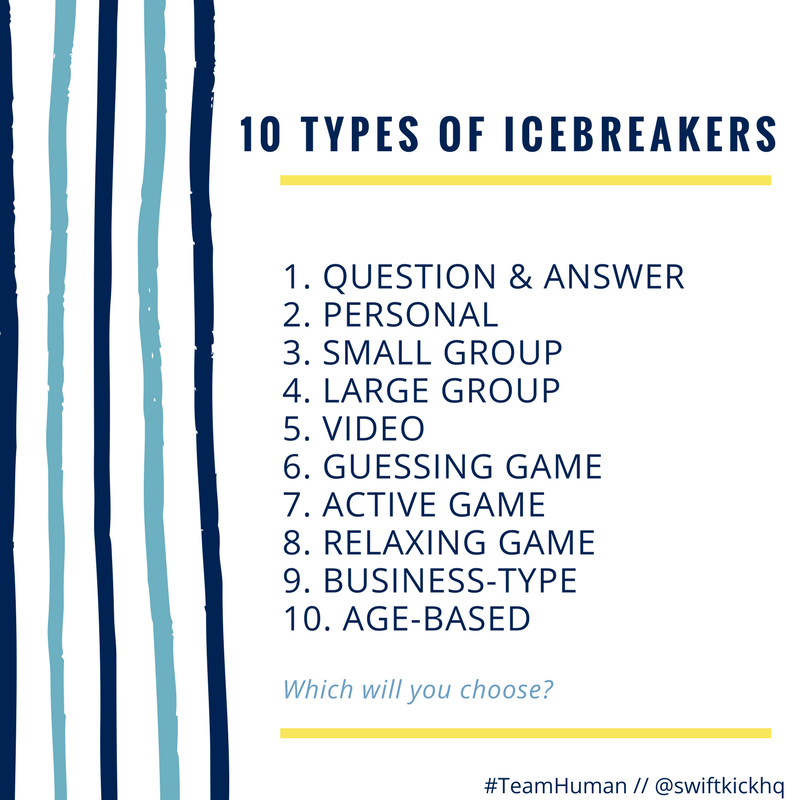For the past few weeks we have learned about why Icebreakers are important, how they are effective and ineffective. So, to end this crash course, let’s review some different types of icebreakers. Options are important! You never want your audience to get bored by using the same types of activities week after week. Take a look and let us know what is your favorite type!
Different types of Icebreakers
Questions and short answers
These types of icebreakers involve different questions that you ask everyone in the group. Some questions might be funny, some might be more serious. The question and answer format works well with groups who don’t know each other that well. Later, you can change up the questions to get to know each other on a deeper level. It all depends on how personally involved the group wants to get.
Personal
This type of activity is normally used when the group has worked together for some time. Typically, we use Personal Icebreakers when we want a group to get to know each other’s preferences and experiences. It helps bring the group closer and become more connected to each other. This type of activity is usually aimed at executive boards or small groups.
Small groups
Small group icebreakers normally range from 2-10 individuals. These Icebreakers are aimed for small groups, executive boards, or small staffs. These tend to include “get to know you” games, talking, drawing, and others. These activities are meant to still be fun for the group, but don’t need a large number of participants. When people think of Icebreakers, they think huge, loud, active games. This is not always true. An icebreaker can be as simple as, “let’s all draw our favorite animal and talk about why we chose it”.
Large groups
These icebreakers are meant for groups of 10+ individuals. This type of Icebreaker is meant to involve more people while still having fun. You can make teams, or do things like guessing games in large groups. A good “hack” for large groups is that you can always break them down. If you have a small group activity, you can split up your large group into smaller ones to do the smaller activity.
Videos
Video Icebreakers are one of my personal favorites. I love playing Kid President Clips to the organization and staff that I oversee. They are inspiring and do not take a lot of time and energy. Sometimes there are people who like icebreakers but are not fans of getting up and moving around. Other individuals may not have the ability to move around. Videos are always the way to go to inspire some, make others laugh, and maybe produce a happy tear every now and then. Then, the group can get to know each other by discussing the video they all watched.
Guessing Games
Guessing games are also extremely fun to play. There are several types of guessing games that you can come up with on your own or find online. For example, guess the movie, guess the song, guess the clip … you get the point. These types of icebreakers are nice for individuals who are unable to move around a lot or individuals who do not like to do interactive games. They like to do things on their own, but still want to be a part of the group. This type of Icebreaker is your way around that. You are able to get everyone involved. To really add to the fun, present a prize at the end!
Active games
Active games are the types of Icebreakers where the group or organization is moving around a lot. These icebreakers tend to be used more when the group is tired of sitting around or is about to sit for a decent amount of time. Active Icebreakers are often used before meetings, or as a break.
Relaxing games
When performing relaxing icebreakers, the group tends not to move around a lot, or at all. Relaxing activities are perfect for groups who are not into running around and tend to stick to things like quizzes, guessing games, and videos. The point of a relaxing Icebreaker is to still have fun but not have to move around while doing so. People are just as capable to meet new individuals during relaxing Icebreakers. A great example of this would be: Who am I, Hot Seat, and Guess the _____.
Business-type
Business Icebreakers are more relaxed and formal. These activities don’t tend to get too personal. This is more of a brainstorming type of Icebreaker. There is still fun, but without the silliness of what you would expect out of college orientation. You can’t exactly run around in a pencil skirt!
Age-based
When performing Icebreakers, you always want to ensure that you’ve considered your audience when deciding which type to do. If you are working with elementary school children, you obviously wouldn’t do a college-level or professional icebreaker. It would be difficult for them to understand and no fun at all. Anytime you are going to present icebreakers, always keep in mind how old the individuals are, or at least their mindset, if the group is varied in age.
Which of these sparked a great idea for your next meeting? Let us know! Until next time, have a great day!
